|
|
|
Sort Order |
|
|
|
Items / Page
|
|
|
|
|
|
|
| Srl | Item |
| 1 |
ID:
128430
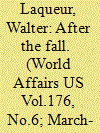

|
|
|
|
|
| Publication |
2014.
|
| Summary/Abstract |
As the Soviet Union disintegrated, ending on the ash heap of history in 1989-91, all the institutes for the study of Marxism-Leninism that had justified the regime, the collected and selected works of the communist classics, and the Marxism chairs in academies and universities also disappeared. From this void emerged a burning question: What was the raison d'être of the existing political system? And later, how did the new regime justify itself in the field of foreign and domestic affairs, and what was its social and economic policy? For the answers, Vladimir Putin and his followers went back to the future. Russia's official ideology prior to 1917 was Pravoslavie, Samoderzhavie,Narodnost, which has been translated as Orthodoxy, Autocracy, Nationality. This statement was made first by Sergei Uvarov, the Russian minister of education, in a circular letter in 1833. Uvarov was a learned man who also served as president of the Russian Academy of Sciences. No one had asked Uvarov to prepare such an official binding declaration. However, Czar Nicholas I liked this "triad," as it was called, even though its meaning was by no means always clear.
|
|
|
|
|
|
|
|
|
|
|
|
|
|
|
|
| 2 |
ID:
088832


|
|
|
| 3 |
ID:
128250
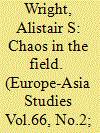

|
|
|
|
|
| Publication |
2014.
|
| Summary/Abstract |
This article traces the creation, experiences and success of Karelia's food supply detachments during the Russian Civil War and focuses on three target provinces: Kursk, Simbirsk and Saratov. It emphasises the early political and economic stumbling blocks faced by the Bolsheviks in their attempts to implement the party's food supply policies in the periphery and indicates that, although the Soviet food supply system by mid-1919 was more centralised and resistance from local soviets lessened, improvements were only relative to the more chaotic conditions of the previous year.
|
|
|
|
|
|
|
|
|
|
|
|
|
|
|
|
| 4 |
ID:
106283
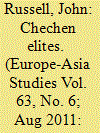

|
|
|
| 5 |
ID:
131790
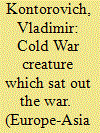

|
|
|
|
|
| Publication |
2014.
|
| Summary/Abstract |
A substantial body of literature argues that government funding motivated by the Cold War shaped (or distorted) the content of the American academic disciplines. This article tests the impact of such funding on the academic study of the Soviet economy, a small field created to help fight the Cold War. It documents the amount of attention given by researchers to the military sector of the Soviet economy, the topic of central importance for the Cold War, and finds that their publications largely ignored it. Considerations other than the interests of the sponsors determined the choice of topics in the discipline.
|
|
|
|
|
|
|
|
|
|
|
|
|
|
|
|
| 6 |
ID:
138041


|
|
|
|
|
| Summary/Abstract |
The end of communist rule and the disintegration of the Soviet Union brough into focus a new world for Russian politics.
|
|
|
|
|
|
|
|
|
|
|
|
|
|
|
|
| 7 |
ID:
129461
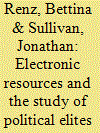

|
|
|
|
|
| Publication |
2013.
|
| Summary/Abstract |
Developments in the information society in Russia have led to the creation of an abundance of online primary texts by political actors and institutions. This article surveys a large selection of official electronic texts with the aim of encouraging more extensive use of online sources and easing researchers' navigation of Russian politicians' use of the internet. While the authors do not claim that online data can replace the insights gained from elite interviews, the article suggests that online texts could be used more extensively as a valuable addition to existing methods applied to the study of Russian political elites.
|
|
|
|
|
|
|
|
|
|
|
|
|
|
|
|
| 8 |
ID:
129543
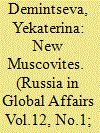

|
|
|
|
|
| Publication |
2014.
|
| Summary/Abstract |
Unlike in Paris or Berlin, where migrants live in districts that they consider their own, and researchers define them as "urban ghetto," we found no such places in Moscow. In Moscow, any district a migrant visits most often or where he lives can become "his place." Spurred by upcoming legislative elections in 2014, debates over migration currently dominate the Russian mass media. A negative image of the migrant has developed as someone who appears of the blue, lives in mysterious "inflatable" apartments, poses "a threat to society," and takes jobs away from local workers. In fact, Moscow city authorities are drafting a code for Moscow residents directed mainly against migrant workers. Young people living in the Moscow suburbs are resorting to radical measures in an attempt to solve migration "problems," thereby fueling conflicts and violence.
|
|
|
|
|
|
|
|
|
|
|
|
|
|
|
|
| 9 |
ID:
152135


|
|
|
|
|
| Summary/Abstract |
Vladimir Putin, the person and the president, is the wild card in Russian politics. After what could be a quarter of a century in power by 2024 (either as president or prime minister), Putin's departure could prove utterly destabilizing. Russia's principal political problem is determining who or what replaces Putin as the fulcrum of the state system in the decade ahead. This essay considers the question of whether “Putin's Russia” – a hyperpersonalized presidency supported by informal elite networks – can transform into a depersonalized system that is rooted in formal institutions with clear, predictable mechanisms to mitigate the risks of a wrenching presidential succession.
|
|
|
|
|
|
|
|
|
|
|
|
|
|
|
|
| 10 |
ID:
162235
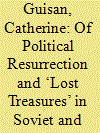

|
|
|
|
|
| Summary/Abstract |
Drawing from the central notion in Russian culture of resurrection, and from Hannah Arendt’s concept of political ‘lost treasures’, this article analyses initiatives for democratisation during the Soviet Thaw (1956–1964) and perestroika (1985–1991); and current attempts to recall the legacy of medieval Pskov and Novgorod’s republican institutions. Retrieving memories of civic action matters intellectually and politically because it roots Russian democratisation in alternative national traditions, which, curiously, both Russian democratic activists and Putin supporters dismiss today. The empirical data come from interviews, ethnographic observations, and studies on Russian/Soviet politics and memory.
|
|
|
|
|
|
|
|
|
|
|
|
|
|
|
|
| 11 |
ID:
133758
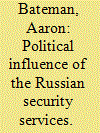

|
|
|
|
|
| Publication |
2014.
|
| Summary/Abstract |
The Komitet gosudarstvennoy bezopasnosti (KGB) has been preserved under the new names of the post-Soviet security services, particularly the Federal'naia sluzhba bezopasnosti (FSB). The continuities between the Soviet and post-Soviet security institutions, coupled with the chaos following the collapse of the Soviet Union, have produced a post-Soviet Russia that has strayed away from democracy and developed into a counterintelligence state. Former Soviet security services officers are the ruling elite in modern Russia. The post-Soviet security apparatus is one of the most influential institutions in the formation of Russia's foreign policy, and the domestic security situation in Russia directly affects its foreign policy toward the United States. The post-Soviet security apparatus has significantly influenced Russia's departure from democracy and pursuance of a hostile foreign policy toward the United States.
|
|
|
|
|
|
|
|
|
|
|
|
|
|
|
|
| 12 |
ID:
129981
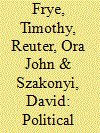

|
|
|
|
|
| Publication |
2014.
|
| Summary/Abstract |
The authors explore how modern autocrats win elections by inducing employers to mobilize their employees to vote for the regime and thereby subvert the electoral process. using two original surveys of employers and workers conducted around the 2011 parliamentary elections in russia, they find that just under one-quarter of employers engaged in some form of political mobilization. they then develop a simple framework for identifying which firms engage in voter mobilization and which workers are targeted for mobilization. firms that are vulnerable to state pressure-financially dependent firms and those in sectors characterized by asset immobility-are among the most common sites of workplace-based electoral subversion. the authors also find that workers who are especially dependent on their employer are more likely to be targeted for mobilization. By identifying the conditions under which workplace mobilization occurs in authoritarian regimes, the authors contribute to the long-standing debate about the economic bases of democratization. in addition, they explore an understudied means of subverting elections in contemporary autocracies: the use of economic coercion to mobilize voters. Moreover, their research finds that clientelist exchange can thrive in industrial settings and in the absence of deeply embedded political parties.
|
|
|
|
|
|
|
|
|
|
|
|
|
|
|
|
| 13 |
ID:
128394
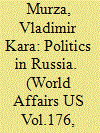

|
|
|
|
|
| Publication |
2014.
|
| Summary/Abstract |
The Kremlin's decision to call a snap election for Moscow mayor in September 2013 may be remembered as a turning point both for Vladimir Putin's regime and for the Russian opposition. For years, the strength of the Putin government has depended not only on its heavy hand but on the lack of an alternative. This vacuum was created and maintained, of course, by the heavy hand itself-shutting down unwanted television channels, disenfranchising (and sometimes jailing) political opponents, and fixing elections. And, for a time, it worked. The shrewdest of Kremlin apologists, both in Russia and abroad, have long ceased to praise the regime, occasionally even admitting its corrupt and repressive nature, but invariably asking, "If not Putin, then who?"
|
|
|
|
|
|
|
|
|
|
|
|
|
|
|
|
| 14 |
ID:
116119


|
|
|
|
|
| Publication |
2012.
|
| Summary/Abstract |
Last winter, a wave of mass demonstrations suddenly broke the surface calm of Russian politics. A new middle class, born of the oil-based prosperity of the last decade, took to the streets to voice its opposition to the perceived corruption of the political elite, especially United Russia, the ruling party of then Prime Minister Vladimir Putin. For a time, as the protest movement gained momentum, the very foundations of the regime appeared to shake. But in the March 2012 presidential election, Putin managed to win comfortably in the first round, and despite widespread charges of manipulation, even the opposition conceded that he had earned a convincing victory.
|
|
|
|
|
|
|
|
|
|
|
|
|
|
|
|
| 15 |
ID:
130841


|
|
|
| 16 |
ID:
144605


|
|
|
|
|
| Summary/Abstract |
In February, Moscow and Washington issued a joint statement announcing the terms of a “cessation of hostilities” in Syria [1]—a truce agreed to by major world powers, regional players, and most of the participants in the Syrian civil war [2]. Given the fierce mutual recriminations that have become typical of U.S.-Russian relations [3] in recent years, the tone of the statement suggested a surprising degree of common cause. “The United States of America and the Russian Federation . . . [are] seeking to achieve a peaceful settlement of the Syrian crisis with full respect for the fundamental role of the United Nations,” the statement began. It went on to declare that the two countries are “fully determined to provide their strongest support to end the Syrian conflict.”
|
|
|
|
|
|
|
|
|
|
|
|
|
|
|
|
| 17 |
ID:
132944
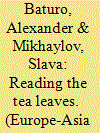

|
|
|
|
|
| Publication |
2014.
|
| Summary/Abstract |
In the absence of public information on the inner workings of the Russian political regime, especially during Medvedev's presidency, outside observers often have to rely on politicians' unguarded comments or subjective analysis. Instead, we turn to quantitative text analysis of political rhetoric. Treating governors as a quasi-expert panel, we argue that policy positions revealed in regional legislative addresses explain how elites perceived the distribution of power between Putin and Medvedev. We find that governors moved from a neutral position in 2009 to a clearly pro-Putin position in 2011, and that policy initiatives advocated by Medvedev all but evaporated from the rhetoric of governors in 2012.
|
|
|
|
|
|
|
|
|
|
|
|
|
|
|
|
| 18 |
ID:
100868


|
|
|
|
|
| Publication |
2010.
|
| Summary/Abstract |
All qualitative research faces fundamental hurdles in overcoming issues of access and ensuring the credibility of one's observations. These issues are particularly acute when conducting research in hybrid regimes when the area of investigation is explicitly political and local authorities are sensitive to scrutiny. In the study of Russian politics, growing authoritarianism has meant a shrinking of the field and a corresponding adjustment in fieldwork practices. The disciplinary silence concerning the impact of regime type on fieldwork further threatens the quality and usefulness of comparative research on non-democratic regimes beyond Eurasia. The danger is that interesting and necessary questions about hybrid regimes are sacrificed as scholars opt to conduct fieldwork in more congenial locales where high status methods may be utilized. One can already see this effect as Russianists leave Russia rather than risk isolation within the discipline.
|
|
|
|
|
|
|
|
|
|
|
|
|
|
|
|
| 19 |
ID:
108202
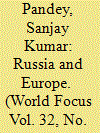

|
|
|
| 20 |
ID:
129464
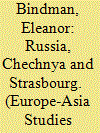

|
|
|
|
|
| Publication |
2013.
|
| Summary/Abstract |
This article explores contemporary Russian official and media discourse on cases concerning human rights violations in Chechnya which have been heard at the European Court of Human Rights. By comparing and contrasting the discourses on the Court's rulings which have been reproduced by various government representatives and various Russian newspapers, the article aims to demonstrate that, while official discourse remains critical of the Court's work with regard to Chechnya, reporting of such cases provides certain media outlets with the opportunity to criticise the government for its perceived failings in relation to safeguarding Chechnya's civilian population from human rights abuses.
|
|
|
|
|
|
|
|
|
|
|
|
|
|
|
|
|
|
|
|
|